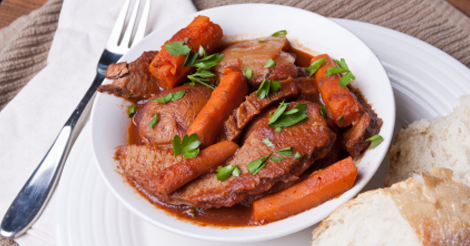Recent studies seem to suggest that eating more healthy fats (like the fat found in fish, nuts, seeds, and healthy oils) is better for weight loss than simply cutting carbs.
In a world obsessed with shedding pounds, this might seem counterproductive--especially after the fat-free diet craze in the early 90's. However, fats help you stay fuller, longer! Of course, if you do need more fat in your diet, make sure you are eating the right fats. Stick to complex poly- and mono-unsaturated fats like the ones found in fish, oils, seeds and nuts.
With help from Cosmoplitan's Anne Mauney, a registered dietitian based in Washington D.C., as well as Lori Welstead, M.S., a registered dietitian at the University of Chicago Medicine in Chicago, Illinois, we have compiled a list of signs that might mean you need to add more healthy fats to your diet.
1. You're starving. If you are still hungry, even after consuming a huge plate of food, it might be because you didn't get enough fat in your meal. "Because your body takes a longer time to processes fat than it does to digest carbs, meals that include fat help keep you feeling full for longer," says Anne Mauney, a registered dietitian based in Washington D.C.
2. Your skin is suffering. "If [your skin is] especially dry, flaky, dull, or it looks older than you are, lack of dietary fat could be the culprit," says Lori Welstead, M.S., a registered dietitian at the University of Chicago Medicine in Chicago, Illinois. While the term "pizza face" might come to mind when thinking of eating too much fat, fat plays an important role in absorbing necessary nutrients that in turn promote healthy skin.
3. You're missing your period, or it is irregular. You might already know that if you are under a certain weight, your period might vanish altogether. That's because your body needs fat in order to balance hormones that help keep a regular period, Welstead explains. (Note: Diet isn't the only thing that can make your period disappear. If things feel out of whack, check in with your gyno before you self-diagnose.)
4. You can't seem to focus. It's the same feeling you get when you unintentionally skip lunch or breakfast--you're just out of it, and you're so hungry you can barely think about anything but food (or sleep). That's because your body needs fat in order to absorb all the nutrients from the food you eat (vitamins A, D, E, and K are fat soluble, meaning your body needs fat to absorb them!). Not to mention, because fat has twice as many calories per gram than protein and carbohydrates, you might accidentally be under-eating.
5. You're experiencing anxiety and even depression. Welstead explains, "Skimping on essential fatty acids like omega-3 and omega-6 can make you feel blah. Fish, flax seeds, and chia seeds are good food sources. If anxiety comes out of nowhere, or you can't knock your bad moods, try eating two weekly servings of fatty fish such as salmon, fresh tuna, or sardines, if you're into that sort of thing, and see if things improve."
6. Your senses get overwhelmed easily. A study from 2009 conducted by the American Psychological Association showed interesting results on the matter. After giving mice varied amounts of omega-3 fatty acids, researchers exposed mice to a soft tone, then a loud tone. Mice who received more omega-3 fatty acids kept their cool throughout the experiment, while mice exposed to less omega-3 fatty acids freaked out. Researchers concluded that omega-3 deficiency might make one more sensitive to sensory overload.
7. You're about to collapse after your usual exercise routine. If you exercise regularly, but suddenly can't seem to keep up with your usual routine, your diet might be the problem. During exercise, your body burns carbohydrates first, and then relied on the calories from fat to keep you moving. If your diet is free of fat, your body simply can't operate the way it could.
8. Your memory is suffering. Large scale studies on older generations have shown that consuming high-fat diets that include foods like olive oil, nuts, fish, and other classic Mediterranean foods can help preserve memory. This is especially true when a high-fat diet has been consumed throughout their lifetime.
What do you think of these signs? Do you experience any of these? Let us know in the comments!





